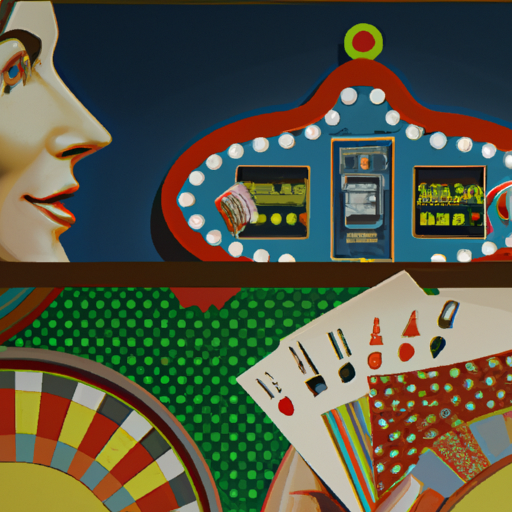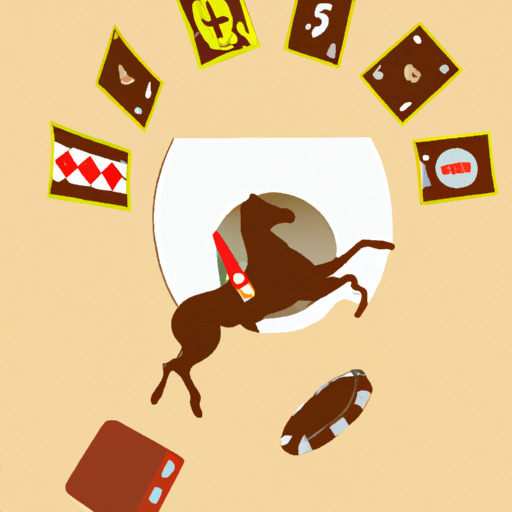
-
TopCasino Slots On-line Slots, Blackjack, Roulette, Betting & Gambling Critiques & Guides: TOC
- Introduction
- The Origins of Gambling Addiction
- The Evolution of Gambling in Society
- The Psychology of Gambling Addiction
- The Impact of Technology on Gambling Addiction
- The Role of Advertising in Promoting Gambling Addiction
- The Connection between Gambling and Substance Abuse
- The Economic Costs of Gambling Addiction
- The Legalization of Gambling and its Effects on Addiction Rates
- The Stigma Surrounding Gambling Addiction
- The Effectiveness of Treatment for Gambling Addiction
- The Relationship between Gambling and Mental Health Disorders
- The Influence of Culture on Gambling Addiction
- The Ethics of the Gaming Industry
- Prevention Strategies for Gambling Addiction
- Future Directions for Research on Gambling Addiction
- Q&A
- Conclusion
Exploring the hyperlink between playing addiction and consumer spending patterns.
Introduction
Gambling addiction has been a prevalent situation all through historical past, with its affect on consumer spending being a vital concern. The historical past of playing addiction dates again to historic civilizations, the place playing was used as a form of entertainment and social exercise. However, as playing grew to become more accessible and widespread, it started to have adverse penalties on people and society as a complete. This article will discover the historical past of playing addiction and how it has influenced consumer spending over time.
The Origins of Gambling Addiction
Gambling addiction is a significant issue that impacts millions of people worldwide. It's a condition that may result in financial spoil, damaged relationships, and even suicide. However the place did this addiction come from? How did it develop over time? And how has it influenced consumer spending?
The origins of playing addiction may be traced again to historic civilizations. The Greeks and Romans have been recognized for their love of playing, and they typically played video games of probability with one another. In reality, the phrase "casino" comes from the Italian phrase "casa," which means home. The first casinos have been established in Venice in the seventeenth century, and they rapidly unfold all through Europe.
In the United States, playing was initially banned in most states throughout the nineteenth century. However, by the early twentieth century, many states had legalized varied varieties of playing, including lotteries and horse racing. The Great Depression of the Thirties led to a surge in playing exercise as people seemed for ways to make cash.
Throughout World Warfare II, playing grew to become even more popular among troopers who have been looking for ways to pass the time between battles. After the war ended, many troopers returned dwelling with a newfound love for playing.
In the Nineteen Fifties and Sixties, Las Vegas grew to become referred to as the playing capital of the world. Casinos like the Flamingo and the Sands attracted celebrities and high rollers from around the globe. Gambling was seen as glamorous and exciting, and many people flocked to Las Vegas to try their luck at the tables.
However, as playing grew to become more widespread, so did problems with addiction. In the Nineteen Seventies and Nineteen Eighties, researchers started learning compulsive playing as a psychological dysfunction. They found that people who have been hooked on playing typically had different psychological well being points akin to melancholy or nervousness.
At this time, playing addiction is acknowledged as a significant issue that impacts millions of people worldwide. It's labeled as a behavioral addiction, which signifies that it isn't induced by a substance like medicine or alcohol. As a substitute, it is characterised by compulsive habits and an lack of ability to control one's impulses.
So how has playing addiction influenced consumer spending? One way is thru the rise of online playing. With the advent of the internet, people can now gamble from the consolation of their own properties. This has made playing more accessible than ever before, and it has additionally made it easier for people to develop addictions.
One other way that playing addiction has influenced consumer spending is thru the marketing tactics used by casinos and different playing institutions. Many casinos supply free drinks, meals, and hotel rooms to entice people to remain and gamble longer. They additionally use bright lights, loud music, and different sensory stimuli to create a stimulating atmosphere that encourages people to keep playing.
In addition, many casinos supply loyalty programs that reward frequent gamblers with perks like free play or exclusive occasions. These programs are designed to keep people coming again and spending more cash.
General, playing addiction has had a vital influence on consumer spending over the years. Whereas some people are in a position to enjoy playing carefully, others wrestle with addiction and its devastating penalties. As society continues to grapple with this situation, it is important to do not forget that assist is out there for individuals who want it.
The Evolution of Gambling in Society
Gambling has been a half of human society for hundreds of years. From historic civilizations to trendy times, people have been drawn to the thrill of taking dangers and doubtlessly winning big. However, with the rise of playing addiction, it's important to grasp how this habits has influenced consumer spending.
The earliest varieties of playing may be traced again to historic China and Greece. In China, video games like Keno and Pai Gow have been popular among the rich elite, whereas in Greece, dice video games have been played by troopers throughout downtime. As playing unfold all through Europe in the Center Ages, it grew to become associated with vice and immorality.
In the United States, playing was initially outlawed in lots of states as a result of its association with organized crime. However, throughout the Great Depression, state governments started legalizing lotteries as a way to generate revenue. This led to the rise of casinos in Las Vegas and Atlantic Metropolis in the Nineteen Fifties and 60s.
As playing grew to become more mainstream, so did issues about addiction. The first formal research on playing addiction was performed in 1975 by Dr. Robert Custer. He recognized three levels of compulsive playing: winning part, shedding part, and desperation part.
In the winning part, gamblers expertise a rush of excitement from their wins and start to believe they'll beat the odds. In the shedding part, they start chasing their losses and could borrow cash or promote possessions to continue playing. In the desperation part, they develop into completely consumed by their addiction and could interact in felony habits to fund their behavior.
Regardless of these issues, playing continued to develop in recognition all through the twentieth century. The introduction of online playing in the Nineteen Nineties made it even more accessible and handy for people to gamble from dwelling.
However, as more people started struggling with addiction, researchers started looking into how it affected consumer spending. A research revealed in 2008 found that downside gamblers spent an average of $5,000 per yr on playing, in comparison with non-downside gamblers who spent only $550.
This has vital implications for the economic system. As more people develop into hooked on playing, they could spend much less cash on different items and services. This may result in a lower in consumer spending and in the end damage companies that depend on consumer purchases.
Moreover, playing addiction may have a adverse influence on people and households. It might result in financial problems, relationship points, and even psychological well being issues like melancholy and nervousness.
In response to those issues, governments around the world have carried out measures to deal with downside playing. In the United States, many states require casinos to supply resources for downside gamblers, akin to self-exclusion programs and counseling services.
However, some argue that these measures are usually not sufficient. They believe that more must be done to forestall addiction from occurring in the first place. This might include stricter laws on promoting and promotions for playing merchandise or elevated funding for analysis into efficient prevention methods.
In conclusion, whereas playing has a long historical past in human society, it's important to acknowledge the potential adverse penalties of addiction. As more people wrestle with this situation, it's essential that we take steps to deal with it and decrease its influence on consumer spending and total financial development.
The Psychology of Gambling Addiction
Gambling addiction is a significant issue that impacts millions of people worldwide. It's a condition that may result in financial spoil, damaged relationships, and even suicide. However how did we get here? How did playing develop into such a pervasive force in our society, and what position has it played in shaping consumer spending habits?
The historical past of playing addiction dates again centuries. In historic Rome, for instance, playing was a popular pastime among the rich elite. They would collect in personal clubs to play video games of probability, typically betting giant sums of cash on the end result. Over time, this practice unfold all through Europe and ultimately made its way to America.
In the early days of the United States, playing was largely unregulated. It was frequent for saloons and different institutions to supply video games like poker and blackjack to their patrons. However, as the nation grew and grew to become more affluent, issues about the adverse effects of playing started to emerge.
In the late nineteenth century, a motion started to outlaw playing in lots of parts of the nation. This was pushed by issues about corruption and organized crime, which have been typically associated with unlawful playing operations. By the early twentieth century, most varieties of playing had been banned in all but a few states.
Regardless of these efforts, nonetheless, playing continued to thrive underground. In reality, throughout Prohibition in the Twenties and 30s, unlawful playing grew to become even more widespread as people seemed for ways to make cash outdoors of legal channels.
It wasn't until the mid-twentieth century that attitudes in direction of playing started to shift once more. In 1961, Congress handed the Wire Act, which made it unlawful to make use of wire communications (akin to telephones) to place bets throughout state strains. This legislation paved the way for states to start legalizing certain varieties of playing inside their borders.
Over time, more and more states started permitting casinos and different varieties of legalized playing. At this time, playing is legal in some form in all but two states (Hawaii and Utah). This has led to a large enlargement of the playing business, with casinos, lotteries, and different varieties of playing producing billions of dollars in revenue every year.
However with this development has come a dark side. Gambling addiction is now acknowledged as a critical psychological well being situation that may have devastating penalties for people and their households. It's estimated that between 1% and 3% of adults in the United States endure from some form of playing addiction.
One of the ways that playing addiction has influenced consumer spending is thru the use of credit cards. Many people who wrestle with playing addiction will use credit cards to fund their behavior, racking up giant quantities of debt in the process. This may result in financial spoil and even chapter.
One other way that playing addiction has impacted consumer spending is thru the marketing tactics used by casinos and different playing institutions. These companies typically use flashy commercials and promotions to entice people to gamble more than they'll afford. They could supply free drinks or meals, or provide incentives for frequent gamblers.
In current years, there was rising concern about the influence of online playing on consumer spending habits. With the rise of mobile devices and easy access to online betting sites, it has develop into easier than ever for people to gamble from anyplace at any time. This has led to a rise in downside playing among younger people, who could also be more prone to addictive behaviors.
General, the historical past of playing addiction is a advanced one which displays each the attract and danger of this popular pastime. Whereas legalized playing can provide a lot-wanted revenue for states and communities, it additionally poses vital dangers for individuals who wrestle with addiction. As we continue to grapple with this situation, it is important to do not forget that accountable playing practices are key to making sure that everybody can enjoy this exercise with out placing themselves or others at risk.
The Impact of Technology on Gambling Addiction
Gambling addiction has been a downside for hundreds of years, but with the rise of expertise, it has develop into more prevalent than ever before. The comfort and accessibility of online playing have made it easier for people to develop an addiction, resulting in adverse penalties not only for people but additionally for society as a complete.
The historical past of playing addiction may be traced again to historic civilizations akin to Greece and Rome, the place playing was a popular pastime. However, it wasn't until the seventeenth century that playing grew to become more widespread in Europe. In England, lotteries have been used to fund public works initiatives akin to roads and bridges. This led to a rise in playing exercise among the normal inhabitants.
In the United States, playing was initially restricted by non secular teams who noticed it as a sin. However, throughout the nineteenth century, lotteries have been used to fund public faculties and different initiatives. This led to a rise in playing exercise among People.
As expertise superior, so did the ways in which people might gamble. The first slot machine was invented in 1895 by Charles Fey in San Francisco. This invention revolutionized the playing business and paved the way for different varieties of electronic gaming machines.
In the Nineteen Seventies, casinos started to appear on Native American reservations as a result of a change in federal legislation. This led to a rise in casino playing throughout the nation. In addition, state lotteries grew to become more frequent throughout this time.
The rise of online playing started in the mid-Nineteen Nineties with the introduction of the internet. On-line casinos and sports betting sites rapidly gained recognition as a result of their comfort and accessibility. Folks might now gamble from the consolation of their own properties with out having to journey to a live location.
However, with this comfort got here a new set of problems. On-line playing made it easier for people to develop an addiction since they might gamble at any time from anyplace with an internet connection. In addition, online playing sites typically supply bonuses and promotions to entice people to gamble more, resulting in elevated spending.
The influence of expertise on playing addiction has been vital. In response to a research by the National Council on Problem Gambling, online gamblers are more prone to develop an addiction than those that gamble in individual. This is because of the ease of access and the lack of social interplay that comes with online playing.
In addition, the use of mobile devices has made it even easier for people to gamble. Mobile Phone playing apps allow people to gamble on the go, making it difficult for them to flee the temptation to gamble.
The rise of expertise has additionally led to new varieties of playing akin to esports betting and virtual actuality casinos. These new varieties of playing have but to be totally studied, but they've the potential to additional improve the prevalence of playing addiction.
General, the historical past of playing addiction shows how expertise has influenced consumer spending. The comfort and accessibility of online playing have made it easier for people to develop an addiction, resulting in adverse penalties for people and society as a complete. It's important for people and governments alike to acknowledge the risks of playing addiction and take steps to forestall it from becoming a widespread downside.
The Role of Advertising in Promoting Gambling Addiction
Gambling addiction is a significant issue that impacts millions of people worldwide. It's a condition that may result in financial spoil, damaged relationships, and even suicide. The historical past of playing addiction is a long and advanced one, with many components contributing to its growth over time.
One of the most vital components in the growth of playing addiction has been the position of promoting in selling playing as a form of entertainment. In the early days of playing, it was primarily seen as a way to make cash rapidly. However, as the business grew and grew to become more mainstream, advertisers started to advertise it as a fun and exciting exercise that anyone might enjoy.
The first main shift in promoting got here in the Thirties when Las Vegas started to emerge as a main playing vacation spot. Advertisers started to advertise Las Vegas as a glamorous and exciting place the place people might go to flee their on a regular basis lives and expertise one thing new and exciting. This marketing strategy proved extremely profitable, and quickly different cities around the world have been following suit.
As playing grew to become more popular, so too did the promoting campaigns selling it. Advertisers started to make use of celebrities and different high-profile figures to endorse their merchandise, additional growing their enchantment to customers. They additionally started to make use of more refined marketing methods akin to focused promoting and social media campaigns.
However, whereas these marketing methods have been efficient at selling playing as a form of entertainment, in addition they had unintended penalties. As more people started to gamble, some people found themselves unable to control their impulses and developed an addiction.
The influence of playing addiction on consumer spending has been vital. People who find themselves hooked on playing typically spend giant quantities of cash on their behavior, main them into debt or financial spoil. This may have ripple effects all through the economic system, affecting not only people but additionally companies that depend on consumer spending.
In current years, there was rising concern about the position of promoting in selling playing addiction. Many countries have launched laws geared toward curbing the affect of promoting on weak people, akin to youngsters and these with a historical past of addiction.
One instance of this is the UK's Gambling Act 2005, which launched strict laws on playing promoting. Under this legislation, playing companies are prohibited from focusing on youngsters or weak people in their promoting campaigns. They are additionally required to include warnings about the dangers of playing in their commercials.
Equally, in Australia, the authorities has launched a ban on playing promoting throughout stay sports broadcasts. This transfer was geared toward lowering the publicity of youngsters to playing commercials and selling accountable playing practices.
Whereas these laws have been efficient in lowering the influence of promoting on weak people, there's nonetheless a lot work to be done. Gambling addiction stays a vital downside worldwide, and it will take a concerted effort from governments, companies, and people to deal with it successfully.
In conclusion, the historical past of playing addiction is a advanced one which has been influenced by many components over time. The position of promoting in selling playing as a form of entertainment has been vital, resulting in elevated consumer spending but additionally contributing to the growth of addiction. Whereas laws have been launched to curb the affect of promoting on weak people, more must be done to deal with this situation successfully. In the end, it will take a collective effort from all stakeholders to deal with this downside and promote accountable playing practices.
The Connection between Gambling and Substance Abuse
Gambling addiction is a significant issue that impacts millions of people worldwide. It's a condition that may result in financial spoil, relationship breakdowns, and even psychological well being points. The historical past of playing addiction is a long and advanced one, with many components contributing to its growth.
One of the most vital connections between playing addiction and substance abuse is the way in which each actions have an effect on the mind. Both playing and drug use stimulate the launch of dopamine, a neurotransmitter that plays a essential position in pleasure and reward. This rush of dopamine creates a feeling of euphoria that may be addictive, main people to hunt out more and more of the exercise.
The hyperlink between playing addiction and substance abuse has been well-documented in scientific analysis. Research have proven that people who're hooked on medicine or alcohol are more prone to develop a playing downside than those that are usually not. Equally, those that wrestle with playing addiction are at an elevated risk of growing substance abuse problems.
One other issue that contributes to the connection between playing addiction and substance abuse is the social atmosphere in which these actions take place. Both playing and drug use typically happen in social settings, akin to casinos or bars. These environments may be highly stimulating, with bright lights, loud music, and different sensory cues designed to create excitement and encourage participation.
In addition to those environmental components, there are additionally psychological components at play when it involves the connection between playing addiction and substance abuse. Many people who wrestle with these points have underlying psychological well being conditions akin to melancholy or nervousness. These conditions can make it difficult for people to control their feelings or cope with stressors in healthy ways.
The historical past of playing addiction dates again centuries, with proof of downside playing found in historic civilizations akin to Rome and China. However, it wasn't until the twentieth century that researchers started to check this phenomenon in depth.
One landmark research on playing addiction was performed by Dr. Robert Custer in the Nineteen Seventies. Dr. Custer recognized three levels of playing addiction: the winning part, the shedding part, and the desperation part. He additionally famous that people who wrestle with playing addiction typically have a historical past of different addictive behaviors, akin to substance abuse or compulsive buying.
Since then, researchers have continued to check the causes and penalties of playing addiction. One space of focus has been on the influence of expertise on playing habits. With the rise of online playing and mobile apps, it has develop into easier than ever for people to access these actions from anyplace at any time.
This elevated accessibility has led to issues about the potential for elevated rates of downside playing. However, some specialists argue that expertise will also be used to assist people who wrestle with playing addiction. For instance, there at the moment are online support teams and counseling services obtainable for individuals who need assistance.
The connection between playing addiction and consumer spending is another space of concern. People who wrestle with downside playing could spend giant quantities of cash on these actions, resulting in financial difficulties and debt. This may have a ripple impact on the economic system as a complete, as people who're in debt could also be much less prone to spend cash on different items and services.
In conclusion, the historical past of playing addiction is a advanced one which includes many components, including environmental, psychological, and social influences. The connection between playing addiction and substance abuse is well-documented in scientific analysis, highlighting the want for built-in therapy approaches that deal with each points concurrently. As expertise continues to evolve, it will be important for policymakers and healthcare professionals to remain abreast of new developments in this discipline and work collectively to advertise healthy behaviors and forestall downside playing.
The Financial Prices of Gambling Addiction
Gambling addiction is a significant issue that has been around for hundreds of years. It's a condition the place a person turns into obsessed with playing and can not control their urge to gamble, even when it causes them hurt. This addiction has had a vital influence on consumer spending all through historical past.
The financial costs of playing addiction are staggering. In the United States alone, it is estimated that the value of downside playing is between $6 billion and $7 billion per yr. This contains the value of therapy, lost productiveness, and different related bills.
One of the earliest examples of playing addiction may be traced again to historic Rome. The Romans have been recognized for their love of playing, and many people grew to become hooked on video games akin to dice and chariot races. This addiction had a vital influence on the economic system, as people would typically spend all their cash on playing as a substitute of buying food or different requirements.
In the nineteenth century, playing addiction grew to become more prevalent in Europe and North America. The rise of casinos and different varieties of legalized playing led to a rise in downside playing. Many people would spend all their cash at these institutions, resulting in financial spoil and different adverse penalties.
Throughout the Great Depression in the Thirties, many people turned to playing as a way to flee their financial troubles. This led to a rise in downside playing, as people would typically spend their last dollar on lottery tickets or different varieties of playing as a substitute of utilizing it for requirements akin to food or lease.
In current years, the rise of online playing has made it easier than ever for people to develop into hooked on playing. On-line casinos and sports betting sites can be found 24/7, making it easy for people to gamble every time they need. This has led to a rise in downside playing around the world.
The financial costs of playing addiction are usually not simply limited to people who're hooked on playing. It additionally impacts society as a complete. For instance, when someone turns into hooked on playing, they could be more prone to commit crimes akin to theft or fraud in order to fund their addiction. This may result in elevated costs for legislation enforcement and the felony justice system.
In addition, downside playing may result in elevated healthcare costs. People who're hooked on playing could endure from a range of well being problems, including melancholy, nervousness, and substance abuse. This may result in elevated healthcare costs for each the particular person and society as a complete.
General, the historical past of playing addiction has had a vital influence on consumer spending all through historical past. From historic Rome to trendy-day online casinos, downside playing has led to financial spoil for a lot of people and has had a adverse influence on society as a complete. It's important for people and governments to take steps to deal with this situation in order to scale back its financial costs and enhance the lives of these affected by it.
The Legalization of Gambling and its Results on Addiction Charges
Gambling has been a half of human historical past for hundreds of years, with proof of playing actions relationship again to historic civilizations. However, it wasn't until the twentieth century that playing grew to become a legal and regulated business in lots of parts of the world. The legalization of playing had a vital influence on addiction rates, as more people have been uncovered to the potential risks of playing.
In the United States, the first state to legalize industrial casinos was Nevada in 1931. This transfer was pushed by the want for revenue throughout the Great Depression, and different states quickly adopted suit. By the Nineteen Seventies, Atlantic Metropolis had develop into a main playing vacation spot on the East Coast, and Native American tribes started working casinos on their reservations.
The enlargement of legal playing led to a rise in downside playing and addiction rates. In response to a research by the National Council on Problem Gambling, roughly 2 million People meet the standards for pathological playing, whereas another 4-6 million are thought-about downside gamblers. These people expertise adverse penalties akin to financial problems, relationship points, and psychological well being issues.
One motive for this improve in addiction rates is that legalized playing makes it more accessible and socially acceptable. When playing is against the law or stigmatized, people could also be much less prone to interact in it or search assist in the event that they develop a downside. However, when it is legal and broadly obtainable, people could view it as a innocent form of entertainment and even a way to make cash.
One other issue is that trendy expertise has made playing more handy than ever before. On-line casinos and sports betting platforms allow people to gamble from anyplace at any time utilizing their smartphones or computer systems. This may result in compulsive habits as people have fixed access to their most popular form of playing.
Regardless of these issues, many argue that legalized playing has constructive financial advantages for communities. Casinos create jobs and generate tax revenue for native governments. In addition, some argue that accountable playing may be a form of entertainment and a way to support native companies.
To deal with the situation of playing addiction, many countries have carried out laws and programs to advertise accountable playing. For instance, in the United States, casinos are required to provide resources for downside gamblers akin to self-exclusion programs and counseling services. Some states additionally use a portion of their playing revenue to fund therapy programs for addiction.
In conclusion, the legalization of playing has had a vital influence on addiction rates and consumer spending. Whereas it has created financial advantages for communities, it has additionally led to a rise in downside playing and adverse penalties for people and households. It's important for governments and business leaders to continue to deal with this situation by means of accountable playing initiatives and support for these struggling with addiction.
The Stigma Surrounding Gambling Addiction
Gambling addiction is a significant issue that has been around for hundreds of years. It's a condition the place a person turns into obsessed with playing and can not control their urge to gamble, even when it causes them hurt. The stigma surrounding playing addiction has made it difficult for people to hunt assist, and this has had a vital influence on consumer spending.
The stigma surrounding playing addiction dates again to the early days of playing. In historic Rome, playing was seen as a vice and was only allowed throughout certain festivals. In medieval Europe, playing was thought-about a sin and was typically associated with witchcraft. This adverse notion of playing continued into the nineteenth century when many countries started to outlaw it.
Regardless of the adverse notion of playing, it continued to be popular among people from all walks of life. In the United States, lotteries have been used to fund public works initiatives akin to roads and bridges. However, by the early twentieth century, many states had banned lotteries as a result of issues about corruption and fraud.
The rise of organized crime in the Twenties and Thirties additional contributed to the adverse notion of playing. Many people associated playing with gangsters and unlawful actions. This association led to elevated regulation of the business, which made it more difficult for people to gamble legally.
In the Nineteen Fifties and Sixties, Las Vegas grew to become referred to as the playing capital of the world. However, even in this period of glamour and extra, there was nonetheless a stigma connected to playing addiction. Many people seen those that struggled with addiction as weak or morally flawed.
The stigma surrounding playing addiction started to change in the Nineteen Seventies when organizations akin to Gamblers Nameless have been based. These organizations supplied support for people struggling with addiction and helped elevate consciousness about the situation.
Regardless of these efforts, nonetheless, many people nonetheless view playing addiction as a private failing fairly than a medical condition. This stigma can make it difficult for people to hunt assist and can result in elevated financial problems.
The influence of playing addiction on consumer spending is critical. People struggling with addiction could spend giant quantities of cash on playing, which can result in financial problems akin to debt and chapter. This, in turn, can have a ripple impact on the economic system as a complete.
In current years, there was a push to legalize and regulate playing in lots of countries. Proponents argue that this will assist scale back the adverse influence of playing addiction by offering more resources for therapy and support. However, opponents argue that legalization will only make the downside worse by making it easier for people to gamble.
In the end, the stigma surrounding playing addiction is a advanced situation that has had a vital influence on consumer spending. Whereas efforts have been made to lift consciousness about the situation, more must be done to deal with the root causes of addiction and provide support for individuals who are struggling. By doing so, we may also help scale back the adverse influence of playing addiction on people and society as a complete.
The Effectiveness of Therapy for Gambling Addiction
Gambling addiction is a significant issue that has been around for hundreds of years. It's a condition the place a person turns into obsessed with playing and can not control their urge to gamble, even when it causes them hurt. This addiction has had a vital influence on consumer spending over the years, as people have lost giant sums of cash as a result of their addiction.
The historical past of playing addiction may be traced again to historic civilizations akin to Greece and Rome. In these societies, playing was seen as a form of entertainment and was typically associated with non secular rituals. However, as time went on, playing grew to become more widespread and started to have adverse penalties.
In the nineteenth century, playing grew to become popular in the United States, notably in the West. Many people noticed it as a way to make quick cash and enhance their lives. However, this led to a rise in downside playing and ultimately led to the growth of therapy programs for these struggling with addiction.
At this time, there are various differing types of therapy obtainable for playing addiction. These include remedy, support teams, remedy, and self-assist programs. Whereas some people might be able to overcome their addiction on their own, most require professional assist.
One of the most efficient therapies for playing addiction is cognitive-behavioral remedy (CBT). This type of remedy helps people determine the ideas and behaviors that make them gamble and teaches them how to change these patterns. CBT has been proven to be highly efficient in treating playing addiction and has helped many people overcome their addiction.
One other efficient therapy for playing addiction is remedy. There are a number of drugs that may assist scale back the urge to gamble and enhance temper. These drugs are sometimes used in conjunction with remedy or different varieties of therapy.
Assist teams are additionally an important half of therapy for playing addiction. These teams provide people with a safe area to share their experiences and receive support from others who perceive what they're going by means of. Assist teams may be found each online and in-individual and are sometimes free to attend.
Self-assist programs, akin to Gamblers Nameless, will also be efficient in treating playing addiction. These programs provide people with a structured strategy to overcoming their addiction and supply support from others who've been by means of comparable experiences.
Whereas there are various differing types of therapy obtainable for playing addiction, it is important to do not forget that not all therapies will work for everybody. It might take some trial and error to seek out the right therapy strategy for a person. However, with the right assist and support, it is feasible to beat playing addiction and regain control over one's life.
In conclusion, playing addiction has had a vital influence on consumer spending over the years. However, with the growth of efficient therapy programs, people struggling with this addiction can get the assist they should overcome it. Whether or not by means of remedy, remedy, support teams, or self-assist programs, there's hope for these struggling with playing addiction.
The Relationship between Gambling and Psychological Well being Problems
Gambling addiction is a critical psychological well being dysfunction that has been around for hundreds of years. The historical past of playing addiction dates again to historic civilizations, the place people would gamble on varied video games and actions. However, it wasn't until the twentieth century that playing addiction grew to become acknowledged as a official psychological well being dysfunction.
Gambling addiction is characterised by an uncontrollable urge to gamble regardless of the adverse penalties it could have on one's life. It might result in financial spoil, relationship problems, and even legal points. The causes of playing addiction are advanced and multifaceted, but analysis means that genetics, environmental components, and mind chemistry all play a position.
One of the most vital ways in which playing addiction has influenced consumer spending is thru the rise of online playing. On-line playing has made it easier than ever for people to access playing actions from the consolation of their own properties. This comfort has led to a rise in the quantity of people who gamble often, which in turn has led to a rise in consumer spending on playing-related merchandise and services.
One other way in which playing addiction has influenced consumer spending is thru the use of credit cards. Many people who wrestle with playing addiction use credit cards to fund their playing actions. This may result in vital debt and financial problems, which can have a ripple impact on different areas of their lives.
The influence of playing addiction on consumer spending will also be seen in the rise of casino tourism. Many people journey to locations akin to Las Vegas or Macau particularly for the goal of playing. These locations supply a broad range of playing-related actions, including slot machines, table video games, and sports betting. The lure of these locations may be sturdy for these struggling with playing addiction, main them to spend giant quantities of cash on these actions.
Regardless of the adverse influence that playing addiction can have on consumer spending, there are steps that people can take to beat this dysfunction. Therapy options include remedy, support teams, and remedy. It's important for people struggling with playing addiction to hunt assist as quickly as doable to keep away from additional financial and private problems.
In conclusion, the historical past of playing addiction has had a vital influence on consumer spending. The rise of online playing, the use of credit cards, and the recognition of casino tourism have all contributed to a rise in consumer spending on playing-related merchandise and services. However, it is important for people to acknowledge the adverse penalties of playing addiction and search assist if they're struggling with this dysfunction. By doing so, they'll take control of their funds and their lives.
The Affect of Tradition on Gambling Addiction
Gambling addiction is a significant issue that impacts millions of people worldwide. It's a condition that may result in financial spoil, damaged relationships, and even suicide. Whereas playing addiction has been around for hundreds of years, it wasn't until the twentieth century that it grew to become a acknowledged dysfunction.
The historical past of playing addiction may be traced again to historic civilizations akin to Greece and Rome. In these societies, playing was seen as a form of entertainment and was typically associated with non secular rituals. However, as time went on, playing started to tackle a more sinister tone.
In the nineteenth century, playing grew to become popular in the United States. This was due partially to the gold rush and the enlargement of railroads throughout the nation. As more people started to gamble, it grew to become clear that some people have been unable to control their impulses.
In the early twentieth century, psychologists started to check playing addiction. They found that it was much like different varieties of addiction akin to alcoholism and drug addiction. Like these different issues, playing addiction was characterised by compulsive habits and an lack of ability to cease regardless of adverse penalties.
As playing grew to become more widespread in the United States, it additionally started to affect consumer spending habits. Casinos and different playing institutions started to market themselves as locations for entertainment fairly than simply places to gamble. They offered shows, restaurants, and different amenities designed to keep customers coming again.
This marketing strategy proved profitable, and quickly casinos have been popping up throughout the nation. Folks started to view playing as a official form of entertainment fairly than a vice. This shift in notion led many people who wouldn't have in any other case gambled to try their luck at the tables.
As consumer spending on playing elevated, so did the quantity of people struggling with addiction. The availability of casinos and different varieties of playing made it easier for people with addictive personalities to indulge their impulses.
At this time, playing addiction is acknowledged as a critical dysfunction that requires therapy. However, the affect of culture on playing addiction can't be ignored. The normalization of playing as a form of entertainment has made it more difficult for people to acknowledge once they have a downside.
In current years, there was a push to control the playing business and provide resources for these struggling with addiction. Many casinos now supply self-exclusion programs that allow people to ban themselves from the premises. Moreover, there are quite a few support teams and therapy facilities obtainable for these looking for assist.
Regardless of these efforts, playing addiction stays a vital downside in lots of parts of the world. The affect of culture on this dysfunction can't be underestimated. As long as playing is seen as a innocent form of entertainment, people will continue to wrestle with addiction.
In conclusion, the historical past of playing addiction is a advanced one which spans centuries. Whereas it has always been current in society, it wasn't until the twentieth century that it grew to become acknowledged as a dysfunction. The affect of culture on this dysfunction can't be ignored, as the normalization of playing has led many people down a path of addiction. It's important for society to acknowledge the risks of playing and provide resources for these struggling with addiction. Solely then can we hope to scale back the influence that this dysfunction has on people and their households.
The Ethics of the Gaming Industry
Gambling addiction is a significant issue that has plagued society for hundreds of years. The historical past of playing addiction may be traced again to historic civilizations, the place people would gamble on every thing from sports to politics. However, it wasn't until the twentieth century that playing addiction grew to become a acknowledged dysfunction.
The rise of playing addiction may be attributed to a number of components. One of the essential causes is the elevated availability of playing opportunities. With the advent of expertise, people can now gamble online or at casinos around the clock. This has made it easier for people to develop a playing downside.
One other issue that has contributed to the rise of playing addiction is the glamorization of playing in popular culture. Motion pictures and tv shows typically depict playing as a glamorous and exciting exercise, which can make it appear more interesting to weak people.
Regardless of these components, the gaming business has continued to thrive. In reality, the gaming business is one of the largest industries in the world, producing billions of dollars in revenue every year. However, this success has come at a value.
The ethics of the gaming business have been known as into query as a result of its influence on consumer spending. Many argue that the gaming business preys on weak people who're prone to growing a playing addiction. This has led to requires higher regulation and oversight of the business.
One way in which the gaming business has responded to those issues is by implementing accountable gaming measures. These measures include self-exclusion programs, the place people can voluntarily ban themselves from collaborating in playing actions. Moreover, many casinos now supply resources and support for people who could also be struggling with a playing downside.
However, critics argue that these measures are usually not sufficient and that more must be done to deal with the root causes of playing addiction. Some have known as for stricter laws on promoting and marketing practices inside the gaming business, whereas others have recommended limiting access to certain varieties of video games or imposing stricter age restrictions.
Regardless of these challenges, there are additionally those that argue that the gaming business has a constructive influence on society. Proponents of the business level to the jobs and financial development it creates, as well as the entertainment value it provides for millions of people around the world.
In the end, the debate over the ethics of the gaming business is advanced and multifaceted. Whereas there are definitely legitimate issues about the influence of playing addiction on consumer spending, there are additionally arguments to be made in favor of the business. As such, it is important for policymakers and stakeholders to rigorously think about all views when making choices about regulation and oversight.
Prevention Strategies for Gambling Addiction
Gambling addiction is a significant issue that impacts millions of people worldwide. It's a condition that may result in financial spoil, relationship breakdowns, and even psychological well being points. The historical past of playing addiction dates again centuries, and it has had a vital influence on consumer spending.
Gambling has been around for hundreds of years, with proof of playing actions found in historic civilizations akin to China, Greece, and Rome. In the early days, playing was seen as a form of entertainment and was typically associated with non secular rituals. However, as time went on, playing grew to become more widespread and started to have a adverse influence on society.
In the nineteenth century, playing grew to become more prevalent in the United States. The introduction of lotteries and casinos led to a rise in downside playing. Many people grew to become hooked on playing and lost every thing they'd. This led to the growth of organizations akin to Gamblers Nameless, which aimed to assist these struggling with addiction.
The rise of expertise in the twentieth century caused new varieties of playing akin to slot machines and online betting. These new varieties of playing made it easier for people to gamble from the consolation of their own properties. As a outcome, downside playing elevated considerably.
At this time, playing addiction is acknowledged as a psychological well being dysfunction by many healthcare professionals. It's estimated that around 2-3% of adults in the United States endure from some form of downside playing. This equates to around 6-9 million people.
The influence of playing addiction on consumer spending can't be ignored. Those that suffer from downside playing typically spend giant quantities of cash on their addiction, leaving them with little or no cash for different important gadgets akin to food and lease. This may result in financial difficulties and even homelessness.
Prevention methods for playing addiction are important in lowering its influence on society. One strategy is schooling. Educating people about the dangers associated with playing may also help forestall them from growing an addiction. This may be done by means of public consciousness campaigns, school programs, and neighborhood outreach.
One other strategy is to provide support for individuals who are struggling with playing addiction. This may be done by means of counseling services, support teams, and therapy programs. These services may also help people overcome their addiction and get again on track.
Regulation of the playing business can be important in stopping downside playing. Governments can implement measures akin to age restrictions, promoting laws, and self-exclusion programs to assist scale back the influence of playing addiction.
In conclusion, the historical past of playing addiction has had a vital influence on consumer spending. It's a downside that has been around for hundreds of years and continues to have an effect on millions of people worldwide. Prevention methods akin to schooling, support services, and regulation are important in lowering its influence on society. By working collectively, we may also help forestall downside playing and make sure that people have access to the support they should overcome their addiction.
Future Directions for Research on Gambling Addiction
Gambling addiction is a significant issue that impacts millions of people worldwide. It's a dysfunction that may result in financial spoil, relationship problems, and even psychological well being points. The historical past of playing addiction is a long and advanced one, with roots relationship again centuries.
In historic times, playing was seen as a form of entertainment and was typically associated with non secular rituals. In reality, many historic civilizations had their own varieties of playing, akin to the Greeks who played dice video games and the Romans who bet on chariot races.
As time went on, playing grew to become more widespread and started to tackle a more commercialized form. In the seventeenth century, lotteries have been launched in Europe as a way to lift cash for public initiatives. These lotteries have been massively popular and quickly unfold to different parts of the world.
The nineteenth century noticed the rise of casinos in Europe and America. These institutions offered a broad range of video games, from card video games like poker to roulette and slot machines. Gambling grew to become more accessible than ever before, and it wasn't long before people started to develop problems with addiction.
In the early twentieth century, governments started to control playing in an try and curb its adverse effects. Legal guidelines have been handed that restricted access to certain varieties of playing or limited the amount that could possibly be wagered. However, these measures have been typically ineffective and did little to deal with the underlying causes of addiction.
At this time, playing addiction stays a main downside around the world. With the rise of online playing, it has develop into easier than ever for people to access these video games from anyplace at any time. This has led to a rise in downside playing among younger people and those that are weak.
One space the place playing addiction has had a vital influence is consumer spending. People who find themselves hooked on playing could spend giant quantities of cash on these video games with out realizing how a lot they're really shedding. This may result in financial difficulties and even chapter.
Research has proven that people who're hooked on playing are more prone to interact in different varieties of dangerous habits, akin to drug and alcohol abuse. They can also endure from melancholy, nervousness, and different psychological well being points.
Regardless of the adverse effects of playing addiction, there's nonetheless a lot that we don't learn about this dysfunction. Future analysis ought to deal with figuring out the underlying causes of addiction and growing efficient therapies for individuals who are struggling with this downside.
One promising space of analysis is the use of cognitive-behavioral remedy (CBT) to deal with playing addiction. This type of remedy helps people determine their adverse thought patterns and develop new coping methods to deal with stress and nervousness.
One other space of analysis is the use of remedy to deal with playing addiction. Some research have proven that certain drugs may also help scale back cravings for playing and enhance total psychological well being.
In conclusion, the historical past of playing addiction is a long and advanced one which has had a vital influence on consumer spending. Whereas governments have tried to control this business, it stays a main downside around the world. Future analysis ought to deal with figuring out efficient therapies for individuals who are struggling with this dysfunction and growing methods to forestall it from becoming a widespread downside in society.
Q&A
1. What is playing addiction?
Gambling addiction is a behavioral dysfunction characterised by the lack of ability to control one's urge to gamble, regardless of adverse penalties.
2. When did playing addiction first develop into acknowledged as a downside?
Gambling addiction has been acknowledged as a downside for hundreds of years, but it wasn't until the twentieth century that it was formally studied and labeled as a dysfunction.
3. How has playing addiction influenced consumer spending?
Gambling addiction can result in extreme spending on playing actions, which can have a adverse influence on a person's financial well-being.
4. What are some of the risk components for growing playing addiction?
Danger components for growing playing addiction include genetics, environmental components, and private traits akin to impulsivity and sensation-looking for habits.
5. How has expertise impacted playing addiction?
Technology has made it easier for people to access and interact in playing actions, which can improve the risk of growing a playing addiction.
6. What are some of the adverse penalties of playing addiction?
Negative penalties of playing addiction can include financial problems, relationship points, legal troubles, and psychological well being problems akin to melancholy and nervousness.
7. How do people with playing addictions search therapy?
Therapy options for playing addiction could include remedy, support teams, remedy, or a combination of these approaches.
8. Can someone get well from a playing addiction?
Sure, with correct therapy and support, people with playing addictions can get well and lead fulfilling lives with out partaking in problematic playing behaviors.
9. How prevalent is playing addiction in society today?
The prevalence of playing addiction varies relying on the inhabitants studied and the definition used, but estimates counsel that between 1-3% of adults in the United States have a downside with pathological or downside playing.
10. What position does promoting play in selling problematic playing behaviors?
Advertising can promote unrealistic expectations about winning and downplay the dangers associated with extreme or problematic playing behaviors.
11. How have legal guidelines concerning playing modified over time?
Legal guidelines concerning playing have various all through historical past and throughout completely different cultures, but in lots of cases, they've develop into more permissive over time.
12. What is the relationship between playing addiction and different addictive behaviors?
Gambling addiction shares many similarities with different addictive behaviors, akin to substance abuse and compulsive buying.
13. How can society deal with the situation of playing addiction?
Society can deal with the situation of playing addiction by selling accountable playing practices, growing consciousness about the dangers associated with extreme playing, and offering resources for people who need assistance.
14. What are some of the challenges associated with treating playing addiction?
Challenges associated with treating playing addiction include stigma, lack of access to therapy, and issue in figuring out people who could also be at risk for growing a downside.
15. What is the future outlook for addressing playing addiction?
The future outlook for addressing playing addiction is promising, as analysis continues to make clear the causes and penalties of this dysfunction and new therapies are developed to assist those that wrestle with it.
Conclusion
Conclusion: The historical past of playing addiction has had a vital influence on consumer spending. As playing grew to become more accessible and socially acceptable, it led to a rise in downside playing and financial hardship for a lot of people. The rise of online playing has only exacerbated these points. It's important for people to remember of the dangers associated with playing and for governments to control the business to guard customers.
















